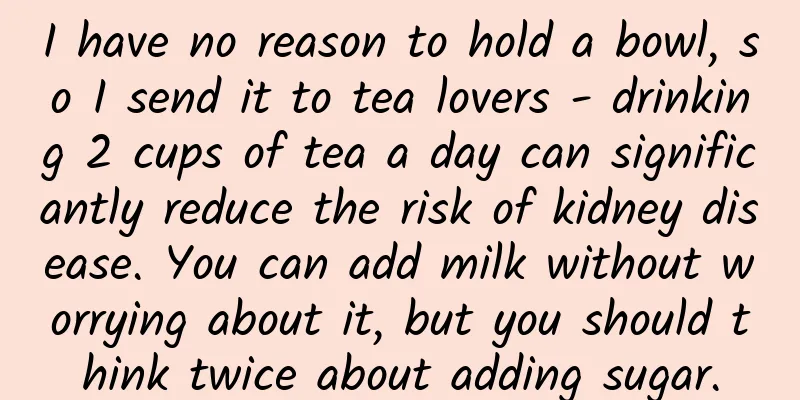I have no reason to hold a bowl, so I send it to tea lovers - drinking 2 cups of tea a day can significantly reduce the risk of kidney disease. You can add milk without worrying about it, but you should think twice about adding sugar.

|
Tea is one of the most popular beverages in the world. Tea is rich in various biomolecules, such as catechins, flavonoids, anthocyanins and phenolic acids, which have been shown to have antioxidant and anti-inflammatory properties, and tea is therefore considered a natural antioxidant. It is reported that tea drinking can reduce the risk of various diseases such as obesity, hypertension and type 2 diabetes. However, it is unclear whether tea drinking can reduce the risk of kidney disease. In addition, in Western countries, black tea is often consumed with milk or sweeteners. Milk tea is also very popular now. Given the potential positive association between sugar-sweetened beverages (SSBs) and kidney disease, it is necessary to further evaluate the effects of drinking sweetened and unsweetened tea on kidney disease. The picture is from the Internet, the copyright belongs to the original author In order to solve the above problems, the National Clinical Research Center for Kidney Diseases of Nanfang Hospital of Southern Medical University has carried out relevant work, and the research results were recently published in the Journal of Global Health . The study found that drinking tea without sweeteners can significantly reduce the risk of chronic kidney disease, but drinking tea with sweeteners has no significant effect on the risk of kidney disease. Academician Hou Fanfan and Professor Qin Xianhui of the National Clinical Research Center for Kidney Diseases of Nanfang Hospital of Southern Medical University are the corresponding authors of the article, and Dr. Liu Mengyi is the first author. The study included more than 170,000 middle-aged and elderly participants from the UK Biobank study who had no chronic kidney disease at baseline and completed at least one 24-hour dietary recall survey. Among them, 83.5% of the participants drank tea regularly, and among those who drank tea, 19.5% of the participants were accustomed to adding sweeteners to their tea. During an average follow-up of 12 years, 3,535 participants were newly diagnosed with chronic kidney disease. The study showed that: (1) Tea intake was associated with new-onset CKD in an L-shaped manner, that is, as tea intake increased, the risk of CKD gradually decreased. When the intake reached 2 cups per day, the risk of CKD reached a plateau (Figure 1A). (2) Further considering the impact of added sweeteners, drinking tea without added sweeteners can significantly reduce the risk of chronic kidney disease (Figure 1B), but drinking tea with added sweeteners has no significant effect on the risk of kidney disease (Figure 1C). (3) Regardless of whether milk is added to tea, drinking tea without added sweeteners can significantly reduce the risk of chronic kidney disease, but drinking tea with added sweeteners has no significant effect on the risk of kidney disease. Figure 1 Dose-response relationship between tea intake and risk of new-onset chronic kidney disease (4) Stratified analysis showed that the association between tea intake and incident chronic kidney disease was not affected by the genetic caffeine metabolism score (the higher the score, the faster the caffeine metabolism), regardless of whether sweeteners were added (Figure 2). Figure 2 Association of tea consumption with no added sweeteners (A) and with added sweeteners (B) with incident chronic kidney disease in subjects with different genetic caffeine metabolism rates This study further verified the association between tea intake without added sweeteners and tea with added sweeteners and the risk of new-onset chronic kidney disease in the young coronary artery risk development cohort. The results showed that compared with participants who did not drink tea, participants who drank tea without adding sweeteners had a 20% lower risk of chronic kidney disease, while participants who drank tea with added sweeteners did not have a significantly lower risk of chronic kidney disease. The picture is from the Internet, the copyright belongs to the original author In conclusion, this large, prospective study suggests that drinking tea without added sweeteners, rather than tea with added sweeteners, is associated with a significantly lower risk of chronic kidney disease. Given that tea is the second most consumed beverage after water, even small benefits on kidney health could have large public health implications. This study suggests that drinking tea without added sweeteners can be part of a healthy diet and may be a simple, inexpensive, and safe strategy to prevent chronic kidney disease. Time disappears in the blink of an eye, in the sniff, in the sip, and in the throat. When guests come from afar, they are often treated with tea. References: Liu M, Zhang Y, Ye Z, Yang S, Zhang Y, He P, Zhou C, Hou FF, Qin 10.7189/jogh.13.04094. Editor | Liu Mengyi and Zhang Yiwei Audit | Qin Xianhui |
<<: Stay up late every day? Here are some tips to effectively relieve eye fatigue!
>>: What is the difference between long-acting and short-acting insulin? Let’s find out!
Recommend
What is the cause of white discharge from nipples during pregnancy?
After pregnancy, there is white secretion from th...
Can a small towel, held every day, lower your blood pressure?
Popular saying: The "clench-and-relax" ...
Does a small uterus affect women's fertility?
The size of a woman's uterus is generally det...
App Annie: 2020 Mobile Report
App Annie released its 2020 Mobile Report, showin...
[Medical Q&A] Is astigmatism hereditary?
Author: Wang Mengyu: The Sixth People's Hospi...
Dysmenorrhea pain index
Menstruation is a physiological reaction for wome...
What is a beautiful vagina?
When it comes to women's private parts, every...
Does brewing Keemun black tea for a long time affect its taste? What kind of tea set is best for brewing Keemun black tea?
Keemun black tea is mild in nature, mellow in tas...
Can pregnant women drink green tea?
After about ten months of giving birth, a woman b...
How many follicles are considered polycystic ovaries
I don’t know if there are follicles in women’s ov...
Anxiety? Depression? ADHD? It turns out they are all related to it →
Tuchong Creative Our emotions and physical activi...
Can pregnant women drink Artemisia water to treat jaundice?
Can pregnant women drink Artemisia water to treat...
Does taking Misoprodol mean I have a miscarriage?
Among medical abortions, misoprostol is one of th...
Causes of blood in leucorrhea
I believe all female friends know about leucorrhe...
Abdominal pain after cesarean section
Many mothers will experience lower abdominal pain...









